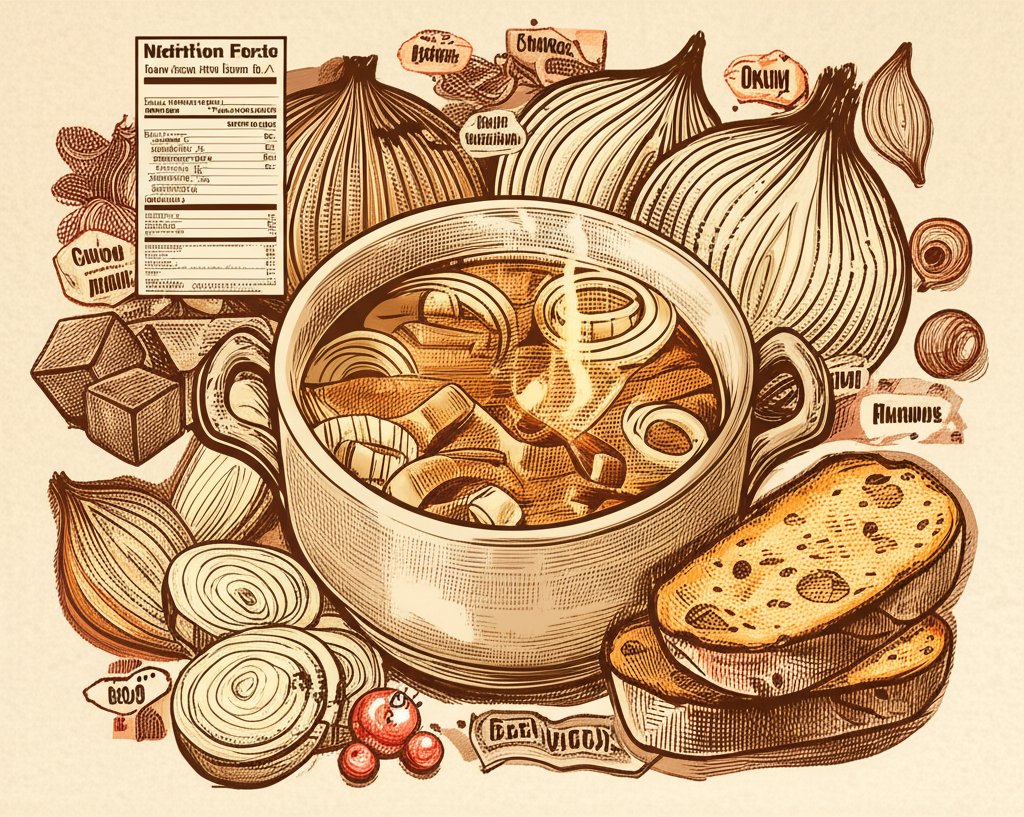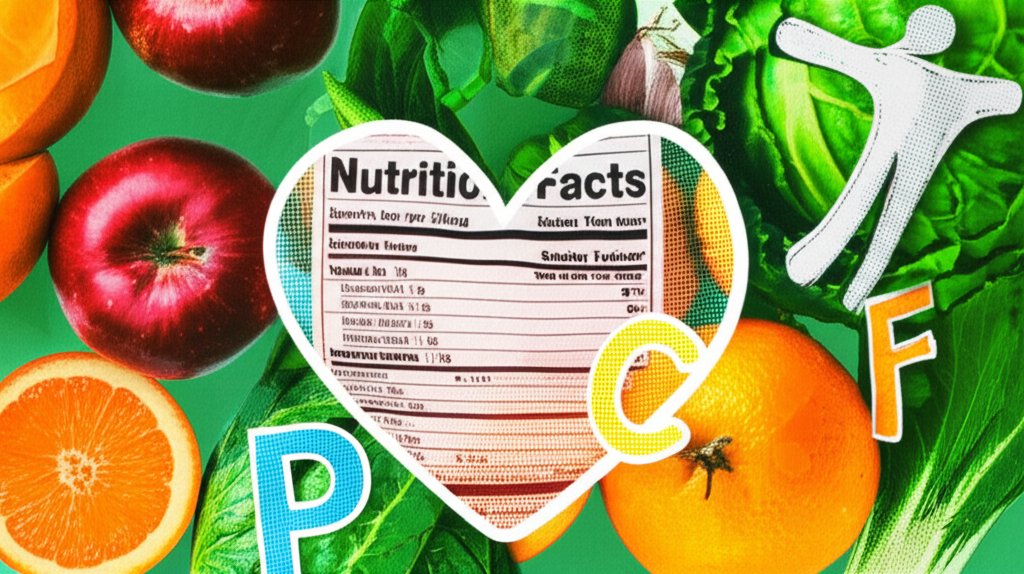Ever wondered if that warm, comforting bowl of french onion soup is secretly a nutritional minefield? The savory broth, sweet caramelized onions, and that tempting, cheese-laden crouton on top all contribute to the overall nutrition profile, making it a dish with both pros and cons. Understanding the ‘french onion soup nutrition facts’ can help you make informed choices about enjoying this classic.
At a glance:
- Discover the key nutritional components (calories, sodium, fat) in french onion soup.
- Learn how the ingredients—onions, broth, cheese, and bread—impact its nutritional value.
- Understand how to modify your recipe to create a healthier version without sacrificing flavor.
- Address common concerns regarding sodium content and potential blood sugar spikes.
- Compare the nutritional profile of homemade versus restaurant versions.
Unpacking the Nutritional Building Blocks of French Onion Soup
French onion soup’s nutritional profile is a sum of its parts. While it can offer some benefits, like nutrients from onions and broth, it’s crucial to be aware of potential downsides like high sodium and refined carbohydrates. Here’s a breakdown of each ingredient’s impact:
- Onions: The star of the show, onions are naturally low in calories and a good source of Vitamin C, fiber, and antioxidants. They contribute to a small amount of the soup’s sugar content after being caramelized.
- Broth: Typically made from beef or vegetable stock, broth is relatively low in calories and can provide some electrolytes. However, commercially prepared broths can be very high in sodium.
- French Bread Crouton: Often the culprit for added carbohydrates and calories, the type of bread matters. As explored in our Nutritional deep dive into French bread, French bread contributes significantly to the soup’s carb and calorie count. Refined white bread offers fewer nutrients than whole-grain alternatives.
- Cheese: Gruyere is the traditional choice, adding richness, flavor, and calcium. However, it also contributes a significant amount of fat, particularly saturated fat, and sodium.
- Butter/Oil: Used for sauteing the onions, butter adds saturated fat and calories, while olive oil offers a healthier monounsaturated fat option.
The traditional preparation methods and ingredient choices contribute significantly to the final nutritional value.
A Closer Look: Typical Nutritional Values and Macronutrient Breakdown
While the exact nutritional content can vary based on the recipe and serving size, a typical 1-cup (240ml) serving of french onion soup contains approximately:
- Calories: 150-250
- Total Fat: 8-15g
- Saturated Fat: 5-10g
- Cholesterol: 25-40mg
- Sodium: 700-1200mg
- Total Carbohydrates: 15-25g
- Dietary Fiber: 2-4g
- Sugars: 5-10g
- Protein: 8-12g
This breakdown reveals that french onion soup can be relatively high in sodium and fat, especially saturated fat, depending on the cheese used. The carbohydrate content mostly comes from the bread.
Example: A restaurant-style serving, often larger than 1 cup and featuring a generous portion of cheese and bread, can easily double these values. Always consider serving sizes carefully.
Tweaking the Recipe: How to Make Healthier French Onion Soup

While french onion soup is a treat, modifications can improve its nutritional profile. Here’s a strategy that works:
- Choose Broth Wisely: Opt for low-sodium or homemade broth to drastically reduce sodium content.
- Minimize Butter/Oil: Use a minimal amount of olive oil for sauteing the onions. Water sauteing can also be considered.
- Lighten the Cheese: Use a smaller amount of Gruyere, or substitute with a lower-fat cheese like part-skim mozzarella in moderation.
- Go Whole Grain: Use a whole-grain baguette for the crouton to increase fiber content. Consider baking your own croutons to control ingredients.
- Increase Vegetable Content: Add other vegetables like carrots or celery to the soup for added nutrients and fiber.
- Consider Portion Size: Enjoy french onion soup as an appetizer rather than a main course to manage calorie intake.
Case Snippet: A home cook successfully cut the sodium content of her french onion soup by 40% simply by switching to low-sodium broth powder and reducing the amount of cheese.
Addressing Common Concerns: Sodium, Sugar, and Blood Sugar
French onion soup often raises concerns about its sodium and sugar content, particularly for people managing specific health conditions.
- Sodium: High sodium intake can contribute to hypertension. Using low-sodium broth and limiting salty cheeses can significantly reduce sodium levels.
- Sugar: The caramelization process naturally increases the sugar content of onions. While this is natural sugar, individuals with diabetes should be mindful of portion sizes and carbohydrate intake.
- Blood Sugar: The refined carbohydrates in the crouton can lead to rapid blood sugar spikes. Choosing whole-grain bread and pairing the soup with a protein source can help mitigate this effect.
Best Practice: Test your blood sugar levels after eating french onion soup if you have diabetes to understand how it affects you personally.
Homemade vs. Restaurant: What’s the Difference?

The nutritional content of french onion soup can vary significantly between homemade and restaurant versions.
| Feature | Homemade | Restaurant |
|---|---|---|
| Sodium | Lower (control over broth and salt additions) | Higher (commercial broth, generous seasoning) |
| Fat | Can be controlled (type and amount of fat) | Often higher (butter, full-fat cheese) |
| Portion Size | Smaller (typically) | Larger (often a full bowl) |
| Ingredient Quality | Higher (fresh, customizable ingredients) | Variable (may use processed ingredients) |
| Control | Complete control over ingredients and preparation | Limited information, standardized recipes |
| Practical Tip: When dining out, ask about the soup’s ingredients and preparation methods to make informed choices. Select other healthy meal options with it to balance nutrient intake. |
Practical Playbook: Your Quick Start Guide to Healthy French Onion Soup
Here’s a step-by-step guide to creating a healthier version of french onion soup:
- Start with Low-Sodium Broth: Use a high-quality, low-sodium beef or vegetable broth as your base.
- Caramelize Onions Slowly: Caramelize onions over low heat with minimal olive oil. This process brings out their sweetness without needing added sugar.
- Add Aromatics: Enhance the flavor with garlic, thyme, and bay leaf.
- Simmer with Wine (Optional): Add a splash of dry red or white wine and let it simmer to reduce the alcohol content.
- Light Cheese, Whole Grain Crouton: Top with a small amount of Gruyere and a whole-grain baguette crouton.
- Broil to Perfection: Broil until the cheese is melted and bubbly.
Decision Tree:
- Concerned about sodium? Use low-sodium broth and less cheese.
- Watching your carbs? Opt for a whole-grain crouton or skip it altogether.
- Want to boost nutrients? Add extra vegetables to the soup.
Quick Answers: Addressing Common Questions and Misconceptions
- Is french onion soup healthy? It can be part of a balanced diet if prepared with healthy modifications and enjoyed in moderation. However, its naturally high sodium content should be considered.
- Does caramelizing onions add a lot of sugar? Caramelization brings out the natural sugars in onions, but the amount of added sugar is relatively low compared to other sugary foods.
- Can I make french onion soup without cheese? Yes, although it will change the flavor profile. Consider adding a dollop of Greek yogurt for creaminess if desired.
- Is it okay to eat french onion soup if I have high blood pressure? Consult with your doctor. Pay close attention to sodium and ensure to drink plenty of water.
Take Control of Your Culinary Experience
French onion soup doesn’t have to be an indulgence to avoid completely. Understanding the ‘french onion soup nutrition facts’ empowers you to make informed decisions, tailor recipes, and enjoy this classic dish in a way that aligns with your health goals. By choosing quality ingredients, controlling portion sizes, and making smart substitutions, you can savor the rich flavors of french onion soup without sacrificing your well-being.










